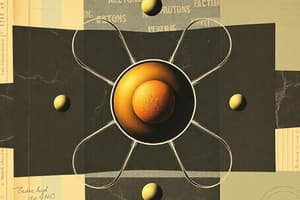Podcast
Questions and Answers
What is the primary factor that determines the element of an atom?
What is the primary factor that determines the element of an atom?
- The total mass of the atom
- The number of protons in the nucleus (correct)
- The ratio of neutrons to protons
- The number of electrons in the valence shell
What is the location of electrons in an atom?
What is the location of electrons in an atom?
- The valence shell
- The electron cloud (correct)
- The nucleus
- The outermost energy level
What is the effect of having a different number of neutrons in an atom of the same element?
What is the effect of having a different number of neutrons in an atom of the same element?
- It affects the electron configuration
- It changes the element of the atom
- It creates a different isotopes of the same element (correct)
- It changes the overall mass of the atom
What is the charge of a neutron?
What is the charge of a neutron?
What is the approximate mass of an electron compared to a proton?
What is the approximate mass of an electron compared to a proton?
What is the valence shell in an atom?
What is the valence shell in an atom?
What is the primary location of protons in an atom?
What is the primary location of protons in an atom?
What is the relationship between the number of protons and the number of electrons in a neutral atom?
What is the relationship between the number of protons and the number of electrons in a neutral atom?
What is the effect of the number of neutrons on the stability of an atom?
What is the effect of the number of neutrons on the stability of an atom?
What is the magnitude of the charge of a proton compared to an electron?
What is the magnitude of the charge of a proton compared to an electron?
Flashcards are hidden until you start studying
Study Notes
Atomic Structure
Protons
- Positive charge: Protons have a positive charge, which is equal in magnitude to the negative charge of an electron.
- Mass: Protons have a mass of approximately 1 atomic mass unit (amu).
- Location: Protons are found in the nucleus of an atom, which is the central part of the atom.
- Number of protons: The number of protons in an atom determines the element of an atom, and each element has a unique number of protons in its atoms.
Electrons
- Negative charge: Electrons have a negative charge, which is equal in magnitude to the positive charge of a proton.
- Mass: Electrons have a very small mass, approximately 1/1836 that of a proton.
- Location: Electrons are found in the electron cloud, which is the region around the nucleus of an atom.
- Energy levels: Electrons occupy specific energy levels or shells around the nucleus, and each energy level can hold a specific number of electrons.
- Valence electrons: The outermost energy level of an atom is called the valence shell, and the electrons in this shell are involved in chemical bonding.
Neutrons
- No charge: Neutrons have no charge, they are neutral particles.
- Mass: Neutrons have a mass slightly larger than that of a proton.
- Location: Neutrons are found in the nucleus of an atom, along with protons.
- Number of neutrons: The number of neutrons in an atom can vary, leading to different isotopes (atoms of the same element with different numbers of neutrons) of an element.
- Stability: The number of neutrons in an atom can affect the stability of the nucleus, with certain numbers of neutrons leading to more stable or unstable isotopes.
Atomic Structure
Protons
- Carry a positive charge, equal in magnitude to an electron's negative charge
- Have a mass of approximately 1 atomic mass unit (amu)
- Located in the nucleus, the central part of the atom
- Number of protons determines the element of an atom, with each element having a unique number of protons
Electrons
- Carry a negative charge, equal in magnitude to a proton's positive charge
- Have a very small mass, approximately 1/1836 that of a proton
- Located in the electron cloud, the region around the nucleus
- Occupy specific energy levels or shells around the nucleus, with each energy level holding a specific number of electrons
- Valence electrons in the outermost energy level (valence shell) are involved in chemical bonding
Neutrons
- Have no charge, being neutral particles
- Have a mass slightly larger than that of a proton
- Located in the nucleus, along with protons
- Number of neutrons can vary, leading to different isotopes (atoms of the same element with different numbers of neutrons) of an element
- Number of neutrons affects the stability of the nucleus, with certain numbers leading to more stable or unstable isotopes
Studying That Suits You
Use AI to generate personalized quizzes and flashcards to suit your learning preferences.




